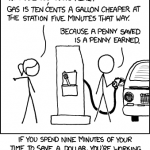muraPOI: October 15, 2011
-
Deconstructing “What Works” in Education Technology: Audrey Watters article got me to thinking more about the story in the New York Times, Inflating the software report card, which I had read earlier.
Digging deeper into the story. Here’s the What Works Clearinghouse page on Carnegie Learning’s Math tutor. I find it interesting that only 4 of 24 studies about the software, drawn from Carnegie Learning’s website in August 2010, met the What Works Clearinghouse’s WWC Procedures and Standards Handbook.
I dislike that the story leads with the “no discernible effects” result, but that’s too simplistic–even for the NY Times. “No discernible effects” is based on 4 studies of about 1700 students may be true but can still be misleading. Are the effects generalizable, presumably that’s one of the criteria for the WWC meta-study? And, one of the things I think the article is trying to do lead the reader by the nose to the conclusion that the software, and all educational technology in general, is flawed because there were “no discernible effects” for a higher investment of resources (“The full curriculum can cost nearly three times as much as a typical textbook over six years”). (At least that’s what I believe the article’s intent is on the first page of the online article.)
The end result is that the article is less damning than it might seem at the outset. Let the buyer beware is still, I believe, a valid concern. More importantly in the context of my current work, is that context and use, of whatever tool, software, or intervention, matter.
(StartupDigest EdTech, October 14, 2011)
(Gabriel, T., & Richtel, M. (2011, October 9). Inflating the software report card. New York Times. Retrieved from http://www.nytimes.com/2011/10/09/technology/a-classroom-software-boom-but-mixed-results-despite-the-hype.html?_r=1) -
YouTube Lets Schools Opt for Educational Videos: This could just as easily be titled, “YouTube tries to make itself more palatable to schools.” I heard about this a week ago, but not until Tina Barseghian’s Mindshift article did I find the details. Apparently YouTube is blocked by most school filtering software. So, YouTube is taking the step of providing a URL pattern that can be whitelisted that includes access only to a selected portion of YouTube’s content–that with “educational” value (meaning it comes from a select list of providers such as universities, public television stations, etc.). Also instead of automatically recommending any videos on the site, they’re limiting the results to those within the education sub-collection. And, they’ve removed the comments and the ability to make contents to limit the potential for objectionable materials.
(StartupDigest EdTech, October 14, 2011)
-
What Made Steve Jobs So Great?: Although written before his death, but just after his resignation as CEO, a good take on Jobs’ importance as a “user of technology.” And the hypothesis that this is one of the things that made him great.
“It’s not totally clear that anyone else can equal his talent for being able to look at Apple’s product’s from the outside view of a user.”
–Cliff Kuang, co.Design(StartupDigest Design, October 12, 2011)
-
TC Disrupt: Reid Hoffman On What He’d Do With Yahoo: Some notes from the interview.
On companies…
- Are companies trying to retain/live in glory days (of hey dey), to the detriment of bold steps?
- Rennovation and rebirth are possible.
- It’s hard to have a company without a 2 year technology plan.
And on people…
- Ask, how do you invest in yourself on a week by week basis?
- Ask, how am I learning more skills, how am I globally competitive, how do I learn how to track what’s going on in an industry/company?
- On risk taking, individuals are probably taking more risks than we think because of changes that have been occurring, but take risk intelligently.
(TechCrunch, September 12, 2011)
-
John Doerr On Apple: “The Steve Jobs Way Of Thinking Goes On”: Doerr says, more important than being early, is being fast.
(TechCrunch, September 14, 2011)



